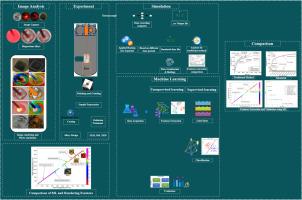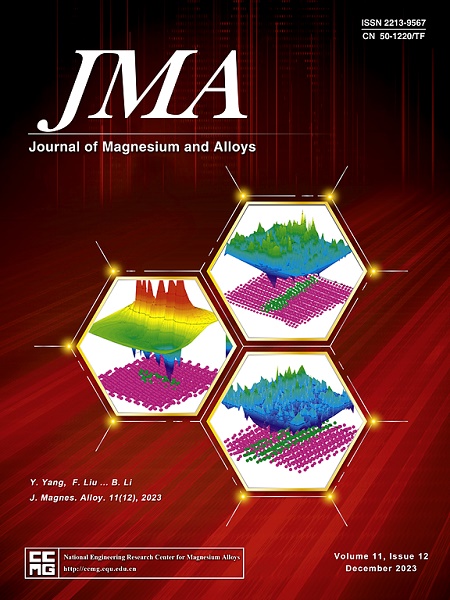Ignition-proof magnesium alloys with rare earth elements: A novel framework to predict combustion phases, surface morphologies, and hidden features using heating rates
IF 15.8
1区 材料科学
Q1 METALLURGY & METALLURGICAL ENGINEERING
引用次数: 0
Abstract
This study presents a proposed interdisciplinary framework for developing ignition-resistant magnesium alloys and analyzing their combustion behavior. It focuses on both commercial AZ31, AZ91, WE43 and formulated Mg-Gd-Y-Zn-Zr alloys with various rare earth elements (REEs) contents. The research integrates experimental methods, heating rate simulations, advanced image processing, and machine learning (ML) techniques to identify key mechanisms that enhance ignition resistance, particularly for aerospace and other industrial applications. A novel alloy composition, Mg-8Gd-6Y-0.6Zn-0.6Zr, demonstrated exceptional non-combustibility in air. The study is systematically to classifies the combustion process into distinct phases and surface morphologies by leveraging supervised and unsupervised learning models based on unseen heating rate features. Advanced image processing techniques reveal dynamic surface morphology changes, including thermal deformation, melting spots, gas bubble formation, and transformations during saturation and post-melting phases, while unsupervised ML models also validate these outstanding predictions of surface morphology features. Additionally, the research highlights the synergistic effects of REEs in forming dense, protective oxide layers, refining microstructures, and delaying ignition. This phase-based analysis provides the combustion behavior of magnesium alloys, which is crucial for evaluating their performance in industrial fire scenarios.

含稀土元素的防燃镁合金:利用加热速率预测燃烧相、表面形态和隐藏特征的新框架
本研究提出了一个跨学科的框架,用于开发耐燃镁合金和分析其燃烧行为。重点研究了商用AZ31、AZ91、WE43以及各种稀土元素(ree)含量的Mg-Gd-Y-Zn-Zr合金。该研究整合了实验方法、加热速率模拟、先进的图像处理和机器学习(ML)技术,以确定增强耐燃性的关键机制,特别是在航空航天和其他工业应用中。一种新型合金成分Mg-8Gd-6Y-0.6Zn-0.6Zr在空气中表现出优异的不可燃性。该研究系统地将燃烧过程分类为不同的阶段和表面形态,利用基于看不见的加热速率特征的监督和无监督学习模型。先进的图像处理技术揭示了动态表面形貌变化,包括热变形、熔点、气泡形成以及饱和和熔化后阶段的变化,而无监督ML模型也验证了这些表面形貌特征的杰出预测。此外,该研究还强调了稀土在形成致密的保护性氧化层、细化微观结构和延迟点火方面的协同作用。这种基于相的分析提供了镁合金的燃烧行为,这对于评估其在工业火灾场景中的性能至关重要。
本文章由计算机程序翻译,如有差异,请以英文原文为准。
求助全文
约1分钟内获得全文
求助全文
来源期刊

Journal of Magnesium and Alloys
Engineering-Mechanics of Materials
CiteScore
20.20
自引率
14.80%
发文量
52
审稿时长
59 days
期刊介绍:
The Journal of Magnesium and Alloys serves as a global platform for both theoretical and experimental studies in magnesium science and engineering. It welcomes submissions investigating various scientific and engineering factors impacting the metallurgy, processing, microstructure, properties, and applications of magnesium and alloys. The journal covers all aspects of magnesium and alloy research, including raw materials, alloy casting, extrusion and deformation, corrosion and surface treatment, joining and machining, simulation and modeling, microstructure evolution and mechanical properties, new alloy development, magnesium-based composites, bio-materials and energy materials, applications, and recycling.
 求助内容:
求助内容: 应助结果提醒方式:
应助结果提醒方式:


